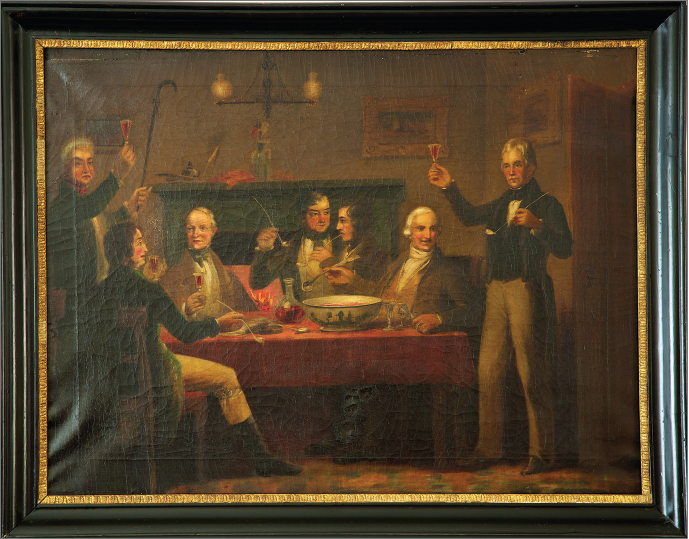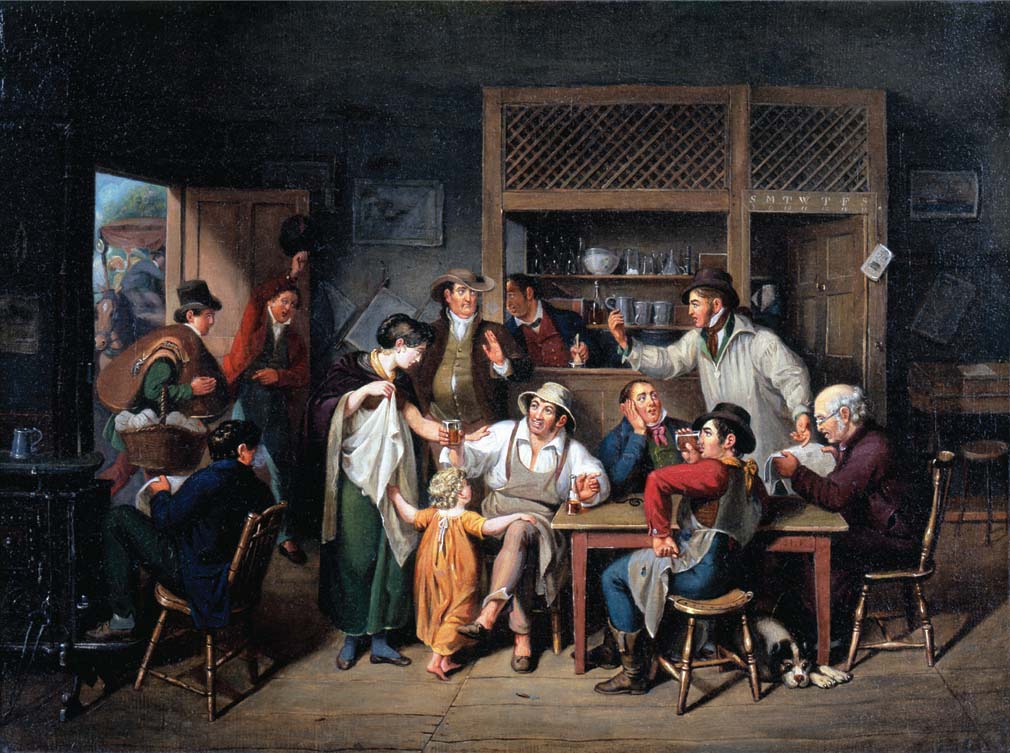America’s History: Printed Page 220
THINKING LIKE A HISTORIAN |  |
The Social Life of Alcohol
Alcohol was ubiquitous in post-Revolutionary America. Expensive wines and distilled spirits traveled through the channels of Atlantic trade; molasses was imported from the West Indies and distilled into rum in American port towns; and cider, beer, and whiskey were produced on a small scale everywhere in the countryside. Taverns were centers of social and political activity. Alcohol both mirrored and reinforced the economic and geographical divisions in American life.
James Newport’s ad in the Pennsylvania Gazette, 1790.
JAMES NEWPORT, At his Wine, Spirit and Cordial Stores, in Second street, at the upper corner of Carter’s alley, has, by Wholesale and Retail,
MADEIRA, Sherry, Lisbon, Teneriffe, Malaga, Fayal, and Port Wines, Jamaica spirits, Antigua rum, Philadelphia ditto, Holland gin, Philadelphia ditto, very excellent, in cases, Coniac [sic] brandy, American ditto, good flavor, choice shrub. CORDIALS, &c. Anniseed water, clove water, all-fours, Cinnamon water, prime wine and rum colouring, wine bitters. Spirits of wine. Retail Stores and Tavern-keepers will in particular, find their interest in buying here, the articles being all the best in their kind, and selling at the most reduced prices. Philadelphia, April 30, 1790.
Benjamin Chew on providing alcohol to his slaves, 1794. The instructions of a prominent Philadelphia lawyer and landowner to his overseer about giving rum to his slaves during the harvest.
I have written … to let you have [illegible] Rum & other necessaries for the Harvest. But as these articles are so [illegible] dear I must recommend it to you to be as sparing of them as possible. … I must rely on you good man [to conduct] the Business. … I would have you let the People have a little Rum — let them be cautious in using too much Spirits during Harvest — it will be well to mix some molasses with water to drink — it is very wholesome & much recommended. … I need not caution you that a great deal depends upon your own proper attention to yourself and that you are careful of good Conduct during Harvest.
Anonymous, The Toast, c. 1810–1815.
 Source: John Nugent Collection, Newburgh, Indiana.
Source: John Nugent Collection, Newburgh, Indiana.John Lewis Krimmel, Village Tavern, 1814. This painting of a postman arriving at a Pennsylvania tavern with letters and newspapers reminds us that taverns were not merely places to drink.
 Source: John Lewis Krimmel (American, 1786–1821) Village Tavern, 1813–1814, oil on canvas, 16⅞ × 22½ inches, Toledo Museum of Art (Toledo, Ohio) Purchased with funds from the Florence Scott Libbey Bequest in Memory of her Father, Maurice A. Scott. 1954.13. Photo Credit: Photography Incorporated, Toledo.
Source: John Lewis Krimmel (American, 1786–1821) Village Tavern, 1813–1814, oil on canvas, 16⅞ × 22½ inches, Toledo Museum of Art (Toledo, Ohio) Purchased with funds from the Florence Scott Libbey Bequest in Memory of her Father, Maurice A. Scott. 1954.13. Photo Credit: Photography Incorporated, Toledo.Public notice from the Pennsylvania Gazette, 1794. Here, a tavern serves as the gathering place for citizens interested in nominating candidates for election to office.
THE INHABITANTS of the County of Chester, are hereby requested to meet at the Centre house, kept by Abraham Marshall, in West Bradford, on FRIDAY the 10th Day of October next, at 10 o’clock, A. M. in order to form a TICKET for the ensuing Election.
Tom the Tinker demands compliance, July 23, 1794. During the Whiskey Rebellion, “Tom the Tinker” pinned this notice to a tree near John Reed’s distillery. Reed had it published in a Pittsburgh newspaper.
In taking a survey of the troops under my direction in the late expedition against that insolent exciseman, John Neville, I find there were a great number of delinquents, even among those who carry on distilling. It will, therefore, be observed that I, Tom the Tinker, will not suffer any certain class or set of men to be excluded [from] the service of this my district, when notified to attend on any expedition carried on in order to obstruct the execution of the excise law, and obtain a repeal thereof.
And I do declare on my solemn word, that if such delinquents do not come forth on the next alarm, with equipments, and give their assistance in opposing the execution and obtaining a repeal of the excise law, he or they will be deemed as enemies and stand opposed to virtuous principles of republican liberty, and shall receive punishment according to the nature of the offense.
And whereas, a certain John Reed, now resident in Washington, and being at his place near Pittsburgh, called Reedsburgh, and having a set of stills employed at said Reedsburgh, entered on the excise docket, contrary to the will and good pleasure of his fellow citizens, and came not forth to assist in the suppression of the execution of said law, by aiding and assisting in the late expedition, have, by delinquency, manifested his approbation to the execution of the aforesaid law, is hereby charged forthwith to cause the contents of this paper, without adding or diminishing, to be published in the Pittsburgh Gazette, the ensuing week, under the no less penalty than the consumption of his distillery.
Given under my hand, this 19th day of July, one thousand seven hundred and ninety-four.
Sources: (1) James Newport, Pennsylvania Gazette, May 5, 1790; (2) Chew Family Papers, Box 773, ff. 25, 10, Historical Society of Pennsylvania; (5) Pennsylvania Gazette, October 1, 1794; (6) Pennsylvania Archives, 2nd ser., 4:61–62 (Harrisburg: E. K. Meyers, State Printer, 1890).
ANALYZING THE EVIDENCE
Question
Who is the intended audience for an advertisement like James Newport’s (source 1)? How many Atlantic ports of call are represented in the products he advertises?
Question
The two paintings (sources 3 and 4), set in the interiors of a private home and a tavern, depict mostly men. What have they gathered for in each case? Village Tavern is set during the War of 1812. How does that fact influence your interpretation of the scene? What do you think the woman and child are doing in the tavern?
Question
Village Tavern (source 4) and the ad calling for a political gathering (source 5) both suggest the way that politics and drinking often mixed. How might the fact that taverns were gathering places for political discussion and decision making have influenced outcomes?
Question
What concerns does Benjamin Chew express in his correspondence with his overseer (source 2)? Given those worries, why do you think he provides rum to his slaves at all?
Question
Tom the Tinker expressed the collective will of whiskey distillers in western Pennsylvania during the Whiskey Rebellion (source 6). Why would it have been important to enforce unanimous action during the uprising?
PUTTING IT ALL TOGETHER
Question
Considering everything you know about the trade and consumption of alcohol, social stratification in the early republic, and differences between urban and rural communities, write a short essay that considers the ways in which taverns and alcohol helped unite people in some ways while differentiating or dividing them in others.